Wow! All hell has broken loose in comic book-land! Last week’s surfeit of Aquarian-born comics creators created a busy circuit of birthday parties, and if I had a dime for every time the name “Gary Friedrich” came up, his legal fees would be paid.
IP Wars are breaking out everywhere. Why here, why now? As always, follow the money. The most visible and lucrative segment of comics industry has, since the great distribution collapse of the ’90s, been primarily in the IP business. Entire comics companies have sprung up just to create movie storyboards masquerading as comics. Big media corporations outfit swanky offices just for the purpose of developing existing IP. It’s become a cottage industry. No wonder then, that controlling and profiting from IP has become THE major preoccupation of the comics industry from the CEO selling movies to the colorist selling prints.
I’ve been storing up links on this subject for the last few days and writing about them has already turned into a novel. Augie DeBlieck has already posted a long essay rounding up many lines of thought, some of which I’ll be duplicating, but if you want to stick around for the ride, hop on the chopper.
While reading others concerned thoughts over the last few days, it dawned on me that the US comics industry is really going the way of doujinshi—the unauthorized, fan-made comics of Japan based on existing properties that are tolerated by the real Japanese publishers as long as they don’t get too big. More than half a million doujinshi fans crowd Comiket, the semi-annual amateur press event, to vie for rare books from the best “circles,” as amateur studios are known. Circles are now important farm teams for pro publishers. CLAMP, the hugely successful manga collective, got its start in doujinshi, as have many other major Japanese creators.
While the concept of doujinshi seems alien to American comics, I think in reality it has already pulled a cuckoo on us—we’ve unwittingly raised its young right alongside our own. “Unwitting” isn’t even the right word. We’ve joyously and happily welcomed the cuckoo into our fold—it’s part of the widespread acceptance of “sampling” in all fields. Yesterday’s Paul’s Boutique is today’s Pinterest board.
Unauthorized drawings of copyrighted characters are such a staple of the internet that I don’t think we realize how embedded they are. Take away the “cute drawings of Robin” posts from Comics Alliance and posting frequency would be drastically cut. The same is true for io9, SuperPunch, and any other website of the Reddit generation. Artists do it, too. Take, for a plucked at random example, the Andy MacDonald Ghost Rider as Biker Scout drawing at the top of this post that I just happened to see while I was working on this. MacDonald has a whole series of nice Ghost Rider sketches on his blog—and I doubt he thought twice about posting them.
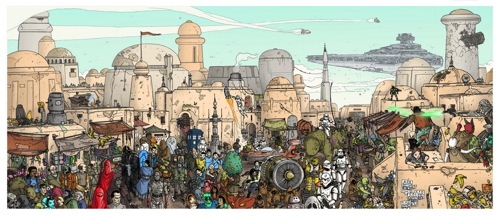
It’s a truly amazing work by an amazing creator. The only problem—he’s selling this as a print. I have no idea what the legalities are, so just go buy one—fast. Lucasfilm has loosened up on the licensing of late—Jeffrey Brown?—but this seems to be a bit more Comiket.
American comics artists have already embraced doujinshi as a means to get their work known. All those sketch blogs and Tumblrs. Heck, people even make their own fan movies, like this Kickstarter-funded Static fan film that was promoted on Robot 6 and everywhere else.
Director Stefan Dezil made the film as a tribute to the character and the late Dwayne McDuffie. Is he profiting from it? Probably not. Technically, it’s copyright infringement, but it’s also the kind of thing that comics companies don’t really care about since, in the words of Marvel Publisher Dan Buckley:
Buckley: We in no way want to interfere with creators at conventions who are providing a positive Marvel experience for our fans. We want fans to speak and interact with the creators who wrote, penciled, inked, lettered, colored or edited their favorite stories. Part of that positive interaction is that a fan can walk away with a signed memento or personalized sketch from an artist.
Dezil, Farinas, and MacDonald are all providing a “positive experience for the fan.” Part of the reason is that the unauthorized art is often better than the official art, like this horrible Captain America flash game I found being advertised on The Beat the other day. 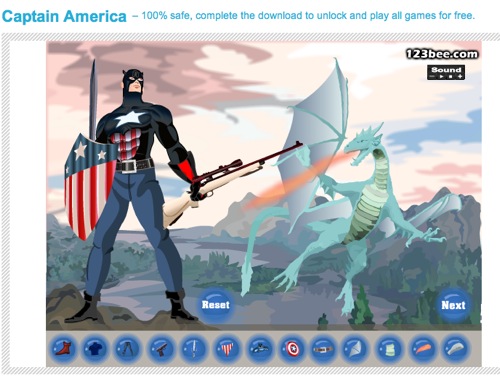
So welcome to Doujinshi Nation, where corporations wring the last drop from every character and professional artists do better work for free than paid artists who are getting a crappy wage.
What is really going on?
So how to do we live in this world? After talking to people in all walks of the comics industry over the last few days, it’s become very clear that Marvel and DC already have policies in place about sketching and sketchbooks.
One of the prime pieces of evidence over the last few days has been this Sean Gordon Murphy post in which he goes on the record with how Marvel stopped him from selling a sketchbook of Wolverine drawings:
Last year I drew the Wolverine ABCs. When it was done, I printed out around 200 sketchbooks of them to hand out to industry friends. I knew enough about copyright law to know that I was in the gray area, even though they were only meant to be given away as gifts. I also gave them to people and editors who worked at Marvel–clearly I wasn’t trying to hide what I’d created. Because I was a pro and because I wasn’t selling them, I figured I’d be fine. After three conventions of EVERYONE telling me I should sell them, I broke down and sold some. At the last show that season, I sold the remaining 40 copies or so.
Then Marvel called. I explained that I didn’t have a warehouse of sketchbooks, I only made around 200 (or close to that) and mostly I gave them away. I explained how none of the Marvel editors complained when I handed them one, and my lack of hiding the ABCs should show the innocent nature of my endeavor. I even offered to sign a Cease and Desist, and pay them the money I made selling the last 40. But Marvel wanted the rights to the ABCs–they wanted to own them and pay me nothing. I wasn’t willing to do that, so I got a lawyer. And we eventually came together and agreed to drop the subject if I simply removed them from my site and promised not to make any more sketchbooks.
I was in the wrong. I really can’t be angry at Marvel for their actions. They were in the right, even though some things at conventions are tolerated, it’s still technically wrong. My mistake was being a higher-profile artist and making a themed book out of Marvel characters. I was surprised that it led to the threat of legal action, but it’s not my call to make. I apologized to Marvel up and down, and I still feel incredibly stupid for what I did.
After talking to a few industry folks over the last week, we can spot what went wrong with Murphy’s plan. In fact, here’s a piece of advice for people who may be printing up their own unauthorized sketchbooks and whatnot: don’t give them to your industry friends. It’s one thing to make something cute, but even your friendly neighborhood comics company employee may have to suddenly become Company Man if he’s handed a trademark-infringing item in his booth.
It seems that one of the reasons that Marvel’s Buckley and Quesada had to make a statement was because they are already negotiating with some creators on sharing profits on their doujinshi sketchbooks. This is a little like Jim Shooter’s retroactive licensing deal but a bit more than $1. We suspect that DC has also dealt with various aspects of this, as they did with the Adam Hughes case.
Although Gary Friedrich’s $17,000 bill for Artist Alley would seem to indicate a chilling effect, our discussion suggests that the “Don’t ask, don’t tell” policy on most casual sketching remains. It’s the printed, organized efforts that would seem to be at the most risk.
And what about Disney and its notoriously ruthless IP police? The most cited case is the famous one where Disney lawyers forced a daycare center to remove murals of Mickey and Donald. Although this case should not be forgotten, it took place in 1989. Disney loosened up quite a bit on the idea of IP after that, with the creation of its very first creator-owned division, Hyperion Books, and even the aborted Touchstone line at Disney Comics. Since then it’s become less draconian about fan art and creators—although, to be fair, it would be hard to be less draconian than painting over pictures in front of bawling toddlers. While Disney remains the most proactive IP protector in the world, I would also not take a 1989 case as an example of the totality of their thinking 23 years later.
Unless, of course, The Ike Option becomes more widespread.
So, again, why here, why now?
Follow the money. In a brutal piece that has received surprisingly little linkage, Beau Smith nailed it with something called Not Fade Away:
Who determines when a comic book creator’s career begins to fade or simply end?
Deadline???Sometimes it’s the creator themself. They’ll miss multiple deadlines with little or no excuses, they’ll become “difficult” and rock the editorial or corporate boat, they’ll become tired of the monthly grind of comic books and decide to return to the nine to five working world, and sometimes they just lose their passion for creating comic books or go crazy and quit.
I’ve seen and worked with young and older talent that has chosen a path of self-destruction when it comes to their career. They were bound and most determined to plant roadside bombs on their own career path and then step on them. I’m guessing when that happens there’s a more deeply rooted emotional problem that is way beyond my education and general people skills. Those creators are their own worst enemies in their goal to create. As long as they don’t drag others down with them, then I figure it’s their own talent to waste, and trust me, I’m sorry to say, I’ve seen some major talent wasted.
A lot of those personal reasons for self-destruction I can understand while others can be more puzzling. I’ve witnessed some creative careers take nosedives because of an editor that comes down with what I call “Raccoon Syndrome”. That’s when they discard a creator that hasn’t done anything wrong or detrimental to the book – and the book may even be months ahead of schedule – but are kicked to the curb because the editor sees another creator that is new, shiny and sometimes unproven in regards to handing a book in on time. The editor(s) will shuffle the talented, established creator off to limbo, just south of Buffalo, and bring in the shiny new creator without training them in what it takes to produce a monthly book, not to mention how that must work with crafting a compelling story and not just being a working cog in the current event of the month. Editors should be editors and teachers, not just traffic managers.
OUCH. It goes on from there. Go ahead and read the whole thing and those of you who have not slit your wrists come back for the discussion.

In 1996, after 29 years as an artist for Marvel Comics, I got fired — 56 years old, two children still in college and no job.
Things had started to get shaky two years before. The American comics industry was taking hits from changing tastes in the youth market — teenage boys had plenty of other entertainment options, mostly electronic — and Marvel couldn’t seem to lure the general population. Never mind that in Japan comic books sell in the millions to all ages. It also didn’t help that Ronald Perelman’s acquisition binge overextended the company, or that Marvel flooded the market with spinoffs and endless No. 1 issues, devaluing the collections of the faithful.
At that time, Trimpe was something of a novelty for being able to go back to school at his advanced age, finish his degree and get a teaching job.
May 27: Turned 56 yesterday. Sent in my application today to the State University of New York’s Empire State College. The Center for Distance Learning offers credit for life experience and independent study for people like me, who can’t attend regular classes. Not sure what I’ll major in. Not art. Maybe history.
Since then, Trimpe—who worked extensively with Gary Friedrich in his Marvel career, and was part of Friedrich’s injuncted convention wares—has become a comics convention mainstay. He looks quite hale and hearty for a man in his 70s and seems happy enough when he puts on his game face.
Most ex-comics pros aren’t as lucky as as Trimpe. They don’t have the willpower and training to start a whole new career. But the internet has a way of stripping away some layers of denial. All of these stories of penniless old-timers who created the character you’re buying the toys of right now haven’t been lost on today’s insecure creators. Doujinshi isn’t a paying career with a pension and insurance. The Age of Anxiety has taken hold.
The other day Tom Spurgeonsketched this spiderweb of worry with another much-linked to post called “Five Reasons To Worry About Comics That Aren’t Piracy.” Goodbye, denial—the internet puts it all out there to see. The piece touches on several problems that I’ve been harping on for the last couple of years, from 10 Days That Shook The World to the tenuous state of making a living at comics. This is another must-read if you haven’t already but for the sake of the present discussion here are the five topics:
1. The ownership of the biggest two comics publishers by gigantic entertainment corporations comes with the constant possibility for sweeping changes based on factors that have little to do with the comics themselves.
2. The Direct Market of hobby and comics shops continues to gray while suffering from infrastructure difficulties and general neglect.
3. The editorial cartooning field has yet to reach its bottom in terms of sustainable staff positions.
4. Whatever on-line market emerges will likely work in drastically different ways from the high-profit-per-piece paper market on which the current industry players depend.
5. We sort of expect people to be broke now, and this is a relatively flush period. What happens when it’s not?
As regards #5, I’ve already seen chipper young cartoonists who were sprightly gadabouts at the SPX of a few years ago walking away from comics in bitterness. Or “Applying to SUNY,” to put it in Trimpe terms. It happens.
Every semester I lecture to a senior cartooning class at SVA. The grads are smart and engaged but have no career path aside from making mini-comics and webcomics and hoping they get a spot in a career-boosting anthology so they can become an Anders Nilsen or Gabrielle Bell. I would submit that we need lots more Anders and Gabrielles, but the ones we have aren’t exactly rolling in bling.
Not everyone is a 1%er. If there were a “You must be as talented as Anders Nilsen” bar to line up to before you got into the comics industry, we’d have a paradise of quality. On the other hand, if Dan Clowes and Chris Ware had been booted out because of Lloyd Llewellyn and Floyd Farland, we’d have no Enid Coleslaw. The young cartoonist’s prospects is a huge topic, however, and examination must wait for another post.
Everyone links Ulises Farinas’s amazing drawings whenever he posts one, but he’s yet to get significant work at Marvel, DC or Lucasfilms, last I heard. You can read his rejected Zuda comic here.
As for topic #3, the creaky state of comics retailing, it is true that the great retailers now resemble aging city-states. It’s getting a little Denethor out there. But we’re still ahead of the game from traditional print, which resembles a Roland Emmerich movie. Image’s Eric Stephenson has a recent post on this topic that twines all these threads once more:
In the big scheme of things, the Direct Market is no more threatened than any other content-based retail business right now. It seems, though, that there’s a growing concern amongst some that as the comics industry becomes more and more entwined with the entertainment industry, the comparatively low revenue generated by the Direct Market in contrast to larger mass outlets, may result in a reduction of support for it, from the very corporate entities it helped build. Which would be a great shame, because the direct market, almost since its inception, has made it possible for talented creative and business people to shape their own independent destinies, and by proxy, has helped refine the material that makes what we do so attractive to the world.
It’s noontime at Image. It’s where the doujinshi circles of Ed Brubaker and Mark Millar are taking the skills they learned copying the creations of others and making their own comics. It’s a business model founded on the Direct Market, however, and to become completely viable it needs that system to last a few more years.
So, action items? It is soothing to look back on John Severin, who died at a good old age, turning out great work until the end, presumably economically sound and surrounded by a loving family. That’s how we all want to go. But now?
A comic book guild or union would be a great idea, but as BK Munn sketches in this history of cat-herding efforts, past attempts at getting a quorum of creators have sputtered out. Plus…unions aren’t exactly very popular in the corporations-are-your-best-friends atmosphere of 2012.
Artist Michael Lapinski has a more DIY idea that calls on the kids to get together at the barn and put on a promotion:
For me, one solution is to join all of our self-marketing efforts under one banner for the month or the Summer of BEFORE WATCHMEN. There are plenty of innovative and industrious retailers that already plan displays and initiatives to answer trends. As DC tried around the time of the WATCHMEN movie release, the goal would be to help shine a light on work, here specifically creator-owned, that is worthy of renewed attention. Very few people will buy books based on a moral high ground alone but there’s plenty of entertainment worthy of their time and money. Call it BEYOND WATCHMEN, call it the Comic Book 99%, whatever we call it, the intention would be to use this window as a global creator/retailer initiative to encourage reading outside the norm in addition to BEFORE WATCHMEN.
I don’t think this is necessarily a bad idea, but a lot of it comes down to content. Some creators need a good hard look at whether their ideas are truly viable in the marketplace of today and the future. It’s not a pleasant prospect.
Finally, the week’s other most quoted post was Kate Beaton’s Q and A on making comics, a sensible piece with both practical—Tumblr doesn’t do archives!—and inspirational information. It’s overall a very positive piece, and I don’t want to be called Negative Nancy for pulling this quote, but it seems to sum up everything we’re concerned about.
How do I get paid jobs in comics?
Wouldn’t we all like to know! That is a question even the pros struggle with. Ideally we’d all be making our own graphic novels right? Usually, when people I know fish for freelance work, they get a lot of offers to.. make a comic about someone’s wife for their birthday (is fifty dollars ok?). It’s cute, but it’s not a real job that you can depend on to pay the bills. And these are talented, experienced friends with resumes stacked to the roof. If getting comic freelance work is your main deal, it’s not going to be easy to get jobs you like. Other people I know have made comics for corporations, promotional items, that sort of thing, not always comics for the comic industry. The way it goes, when you gots to get paid.
Here’s the biggest truth about comics that we all know is not going to change any time soon: we all wish comics had more money in it.
And there we will leave it for now. Other forces are swirling about—Kickstarter, book publishing, the iPad—but we’re saving that for the sequel.


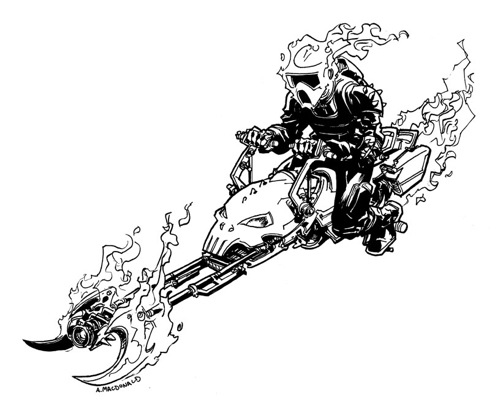
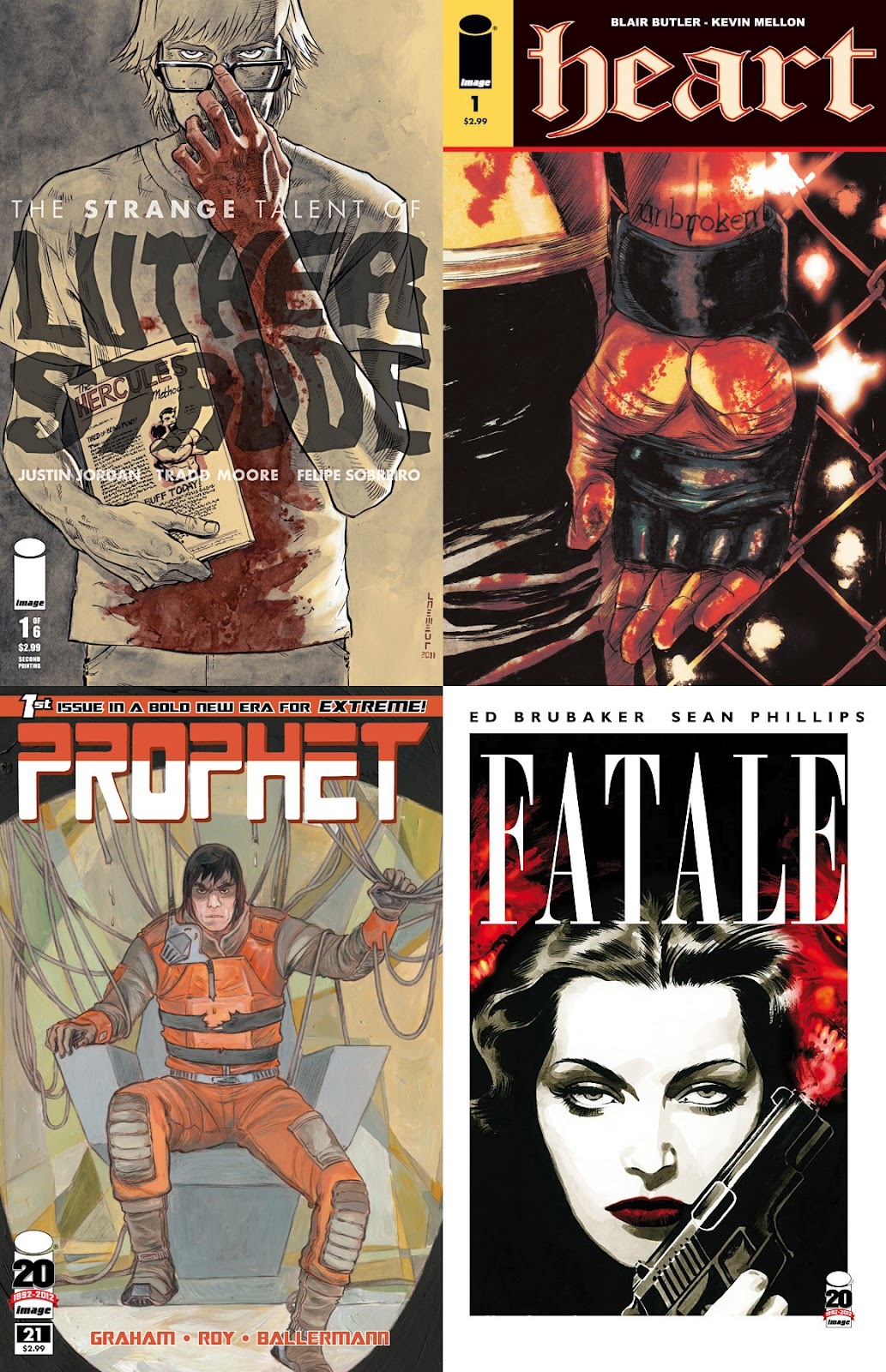
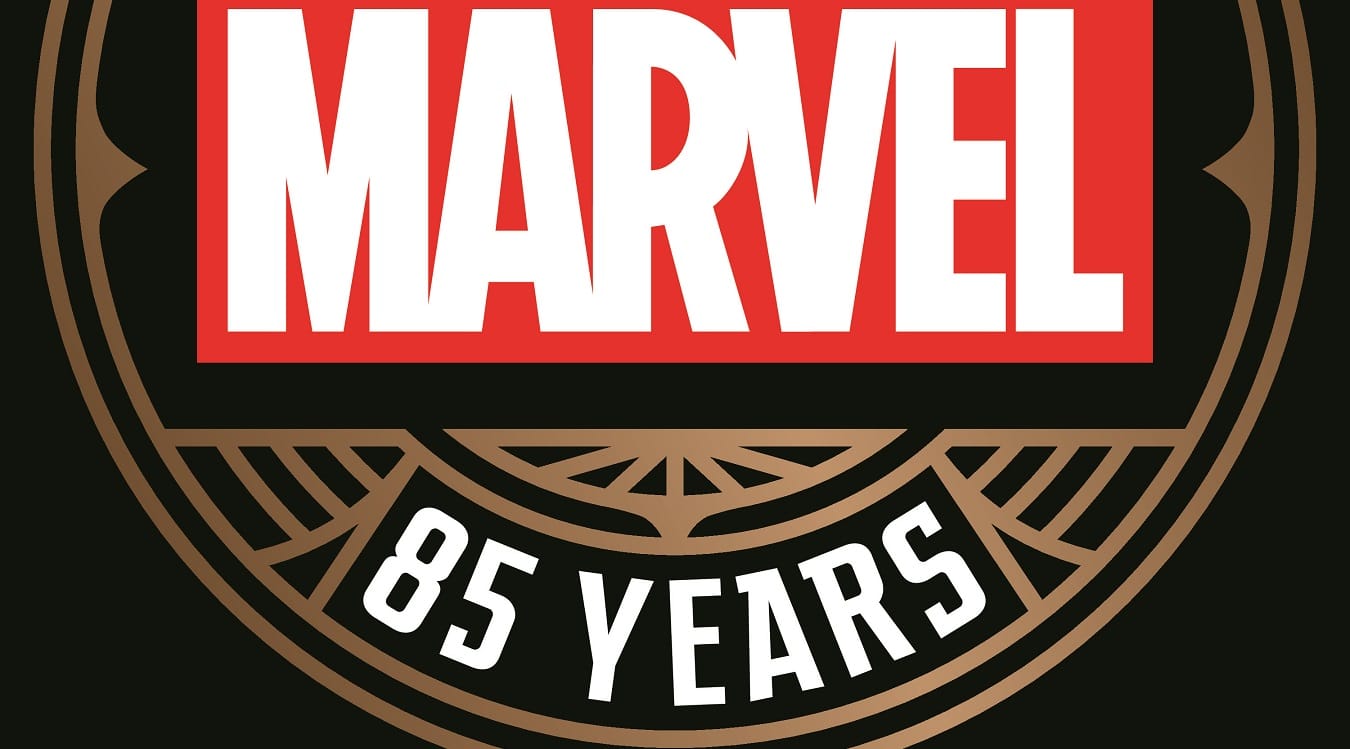
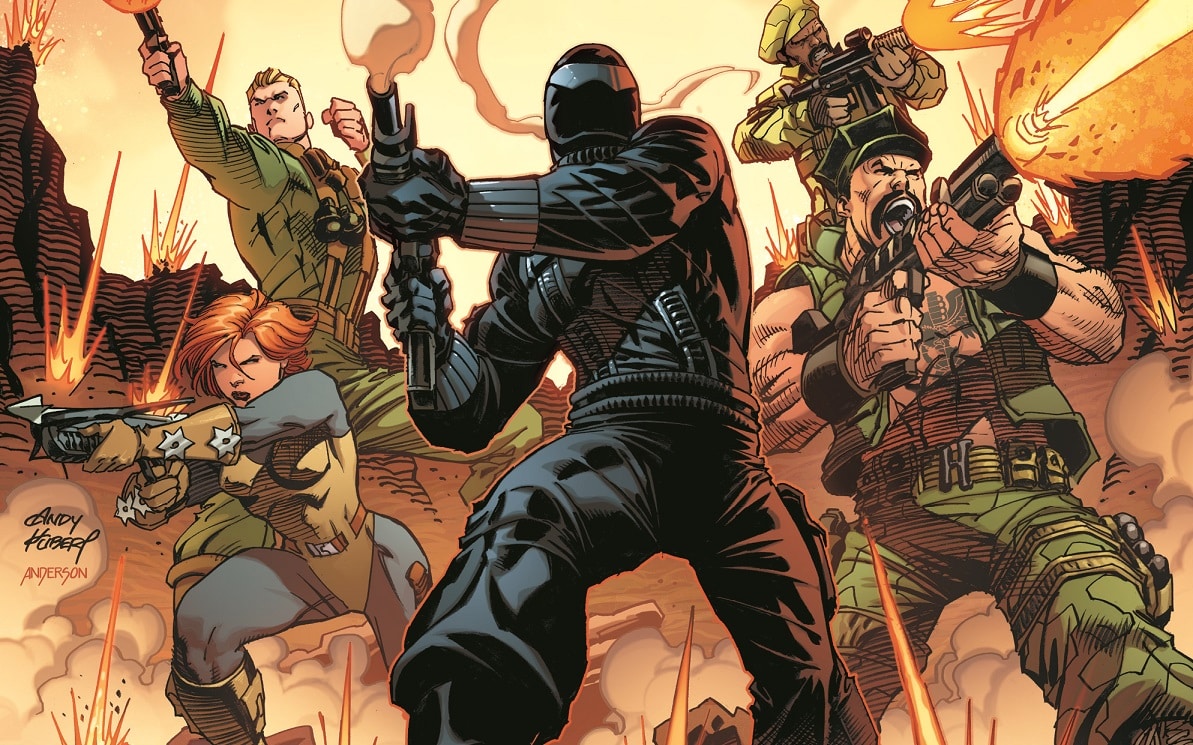




A terrific reflection on a complex moment in history, publishing and comics. I sure don’t have no answers. I came to New York city in 1981 looking to be a gallery artist (not a comics artist), probably the only discipline with less “job” security than comics. 30 years later I’m an editor and a reporter (my art life is on hold, though I worked and showed regularly in NYC up until about 2005) and happy to be editing and reporting (on comics too!) for a good salary. It ain’t being an artist but it also ain’t bad.
It’s a jungle out there.
The most visible and lucrative segment of comics industry has, since the great distribution collapse of the 90s, been primarily in the IP business.
>>
Right you are — and unfortunately a (short term) business model largely geared to further exploit past creators, while offering little or nothing to new talent -who are largely tasked with fashioning King Kirby (etc) for the modern taste.
A system now fronted by a few “corporatist artists” (Quesada/Lee) who connived their way to big checks.
…What a revolting development.
After reading this article, i have to admit i feel a little weird. But my only response is, nobody looked at my work until i started drawing black-market licensed work. It is sad, but i gotta pay bills. And if i draw a lego-dude as Green Lantern, everyone is impressed. But if i just draw my own work, everyone’s just “eh”. I freelance fulltime now, and my biggest break was from drawing a 14 page unauthorized batman comic. Meanwhile, i had over 100 pages of a comic of my own character and story.
I think the biggest thing for those who want to get their own work out there is to do webcomics. I think webcomics are going to be what’s next in self publishing comics. It’s building an audience where you can live off advertising and merchandise streams. I’m not more surprised more folks are looking at Interventioncon in DC or webcomics con in Ct to learn more about breaking and making it in that field.
This is the kind of well-researched and intelligent article I come to The Beat for.
Lots of food for thought. It seems like the crisis of the past ten years has now gotten to a point now where we can no longer put on a brave face and pretend that things will be okay. There is no shortage of passion within the field of comics. What is lacking is business originality and enthusiasm within the readership (for things over than blockbuster movies).
“A system now fronted by a few “corporatist artists” (Quesada/Lee) who connived their way to big checks.”
—what a bunch of hooey. Their talent did not connive a damn thing. Cowardly nonsense…
What Calvin said. Nice one Heidi!
Thanks for sharing~ I feel like webcomics is a great field to mention! Some webcomics that I follow right now have been releasing print versions of chapters with extras. (eg. Teahouse or SFEER Theory) As long as there are enough readers that feel devoted enough to buy it, there will be a market for comics! It’s also the audience that you’re gearing it towards, like if they appreciate your style/story enough to have a physical copy. I’ve been buying a few books from the artist who just sells it off their website or a kickstarter project or even goes to conventions to promote it.
I don’t know much about IP business, but it’s definitely different in Japan or even in France, where comics are celebrated more. I would love for you to do a followup article on how it works in Japan?
I often feel that one of the problems with comics is the doujinshi thing, but not in the way people think of it. I look at a lot of the modern versions of something like the Fantastic Four (a random example, no offesnse to whoever may actually currently be working on that book as I haven’t read it in years) & feel like what Marvel is publishing amounts to fan fiction rather than using highly skilled artists & writers. I know the factory system totally sucked, but it did make the folks work enough that the survivors leveled up to an incredible craft & then most of them graduated out of comics & into other careers. I wonder if comics went back to something people only worked in for five to ten years if we’d start to see more innovative & interesting work popping up in the same volume as the golden age (says the golden age fan).
Dear Beat (at stately Beat Manor),
After reading the Kickstarter and Friedrich stories here, and then this article, I came up with a new business model for Marvel.
While I’m not saying Marvel should stop publishing themselves, Marvel should open up their characters to a Kickstarter-type system where creative teams could post pitches that readers could vote on with their dollars.
Marvel could set up an editorial board similar to what exists at Kickstarter. Maybe they extend editorial services to projects that get funding (for a fee that would be listed in the funding). Basically, the project must not damage the brand (no pornography, etc.) but otherwise the pitches can do anything.
After hearing about the number of comics projects successfully funded through Kickstarter, I read the Kickstarter site. I’m proposing Marvel do that, with all the safeguards in place, but for Marvel characters only. Pitches for merchandise, comics, clothing, whatever. Marvel/Disney could even offer to broker printing or manufacturing services (again, for a fee that would be part of the funding structure).
Marvel would take a cut, a percentage, probably a larger percentage than Kickstarter does, but they would want to set up some kind of standard pricing structure for what could be done, with the variable being what the potential creator set for his own fee. If the bids go over that amount, Marvel’s cut goes up, and the creators get more money.
Diamond could even order copies of successful projects for the store, increasing the print run at no cost to the creator or Marvel.
This would be a win for Marvel because it could allow creators to have sanctioned material they could sell at conventions, and Marvel/Disney would get their cut right off the top, and as long as the creators deliver, there’s no way Marvel could lose money off the deal. They’d get the chance to approve or kill the projects before they ever got off the ground if they don’t like them, but otherwise have no overhead involved. New Marvel Comics that fans wanted would get made without Marvel having to put up any money to get it made. And again, there’s nothing that would stop Marvel from putting out their “official” line of comics.
Imagine if professional artists got involved, and not just comics artists, either. They could put together a proposal, name their price up front, and if the funding doesn’t show up in 60 days (or whatever), no harm, no foul. But if it does, the artist starts work knowing the money’s in the bank and all of the costs have been met. Of course, there would be stiff penalties for those who didn’t follow through, stern enough to absolutely discourage fakes.
Marvel would own the work, of course, but this system would also afford them to pay royalties. It’s like, they get new intellectual property to exploit for free, and people with creative talent get a chance to play with the toys.
Of course, DC could do this, too–as could any entity which has IP to exploit. I was thinking Marvel as this would be a solution to take care of people like Gary Friedrich.
Imagine, Gary could team up with an artist, like Herb Trimpe, and they could submit a pitch to Marvel-Kickstarter. Gary could pitch a project to create a new comic that he and Herb could print and sell at conventions. Marvel gets a cut off the top, enough to pay for their involvement and then some, and they get to approve the material.
How could this lose?
The problem wasn’t the wolverine art was turned in by a company man, the problem is, legal shares a building with people who displayed it or showed it off. Larger companies legal and creative departments often times share a body but have different heads.
The biggest issue aside from selling the sketches is the fact they were reproduced and then sold. This is a far reach from a personalized sketch and he could have gotten away with selling them, but I doubt the people he gave them to at marvel went out of their way to rat him out, it’s just as simple as, “Word gets around”
hear hear — great reporting
I think the relationship (really begun in blatant easrnest by good ‘ol Platinum) was that comics were, like you say, storyboards. But now that some IPs have made the big jump to film, how should print react? I find it fascinating that Marvel is pretty much basing its entire summer print schedule around Avengers (and the movie) while DC, with a big Batman film, is doing…Before Watchmen? BW will be a huge hit in the direct market, but wouldn’t a Geoff Johns/Jim Lee 12-issue “Bane’s Revenge” have more appeal to those seeing the movie? I honestly don’t know, and since Watchmen was the first comic to show that a movie could really sell a comic, I guess there’s your answer.
I am a teacher and the unfortunate part to all of this, cliched as it may sound, is it is hard to get a job/career/happy times anywhere. Students are now forced to re-invent themselves in dramatic ways that people in the past might have been able to hold off doing until middle age, if then. Students now have to do it as soon as they graduate. But that’s not an excuse: find your audience.
I like the Marvel Kickstarter idea — obviously the 80-story curb is the legal. Because now if someone draws something “offensive,” Marvel can say it’s not ours, whereas under the Kickstarter-y model if someone got funded, then added in something else, it would have a big old Marvel “M” down in the corner. Still, a really interesting idea. As someone (maybe Heidi said) if Lucasfilm allows fan films, etc. now (absolutely unheard of years ago), then anything is possible. If anything, their relaxed approach helped open the door to its renewed popularity. Nerd stuff is driven by fans: involve them and they will buy stuff.
Carlton: My first thought was “That would never work” because, 1) that would pretty much kill the direct market, and 2) Marvel would never go over the direct market’s heads that blatantly.
But the more I thought about it, it *could* work. If you use the tiered reward program that most Kickstarter projects use to offer things like (at $20, a subscription to the 5-issue miniseries in comics form; at $40, a trade paperback when the series is complete; at $60, a signed TPB; at $75, a hardcover; at $100, a signed hardcover; at $200, a signed hardcover with an original sketch) AND made these same offers (particularly the higher end collectible ones) available to retailers at a discount, then it’d be win-win for everybody: retailers could state their support for a project they think they can sell up front just like their customers, AND they get something they could turn around for a nice profit in their store.
Interesting food for thought, Carlton.
“It’s where the doujinshi circles of Ed Brubaker and Mark Millar are taking the skills they learned copying the creations of others and making their own comics.”
Both of whom were producing lauded original work before they wrote a word for Marvel or DC.
“Both of whom were producing lauded original work before they wrote a word for Marvel or DC.”
And made so much money with their original work they lived happily ever after and never had to dirty themselves with work-for-hire exploitation of other people’s more successful creations.
Oh, right.
Mike
@Carlton: An interesting idea that bears closer examination. If for no other reason than it takes a lot of risk out of a publisher’s hands. They only need to touch the product twice: first approval and final approval. If they did it right rejection would also consist of a cease and desist. LOL
LOVE this article.
It hits home for me in several ways. I don’t have any silver bullets in my pocket (I’m sure nobody does), but this well researched piece is why I come to The Beat… it spurs the reality of how I think about the industry and what I hope for it and what I hope to do about it in my lil’ corner of the world.
Are we really coming to a point where it’s every man for themselves?
I’m too lazy to rewrite my posts for the past few days but:
To Sean G:
“Dunno man, I don’t see any other reason to support Marvel and DC when it comes to copyright law other than to make sure you keep work and get food on the table ( don’t blame you ) …But these huge companies have been reaping creators for decades from using courts to steal off other characters from companies ( Shazam ), to weaseling rights away from creators ( Watchmen ), to Disney extending copyright so it can keep Mickey Mouse out of public domain at the cost of making tons of books fade away from being re-published ( [link] ) …I feel like this big publishers abuse the shit out of creators. In the music industry at least you can obtain licenses to cover songs ( essentially fanart ), and yet publishers have made sure to not set up anything like that for creators when they had the chance ( like the ghost rider thing ).
I don’t expect you to fight them or anything, but “I’m siding with Marvel, DC, or any corporation who was the right to protect its interests. Marvel and DC should love that someone is making this statement, and out of his own free will” kind of makes me sick, because “right to protect its interests”? What right? You mean the rights you buy with money? The rights you get in court because you have the money to beat any creator who wants some kind of change? They don’t give two shits about you, they didn’t care when you tried to make things right, and they sure as hell don’t care you’re making some DA post about how they are 100% in the right.
But all in all this is a small set back to progress. If you look at videogames ( [link] ) and digital distribution in music, comics, and games, it shows that there will be a future where we can out power publishers and start calling the shots for once.”
General comment in another article:I think people mistake publisher rights being equal to creators rights. They compare fanart being sold ( essentially REMIXES which can be sold within reason in the music industry with proper procedure.) of a companies character, to boot legging, or someone manufacturing tshirts of a single creators character unauthorized. People keep trying to boil down the argument by trying to compare things that are not comparable and it’s lazy and stupid.
To Dan S: Corporations aren’t any more evil than a lion. They are predators period.
A person can feel bad, or decide going after an ally isn’t worth the trouble. A corporation cannot, because it’s sole purpose is to continue existing. That’s why you say things like:
“If the company DOES NOT aggressively defend their trademark/copyright/IP they set a precedent so that the NEXT person/company/illegal sweatshop/what-have-you CAN steal the copyright in the SAME manner and/or a larger scale.”
And it’s true, companies will do whatever they have to to make sure they NEVER lose. Even if they are wrong, and somehow they do lose? They’ll make sure to cram in more legal safety into their wording and hide legal safety on the backs of their checks. And in the end CORPORATIONS get to make the rules, not the creators.
It is beyond me why music can be remixed, and people can obtain licenses to make small print runs, but somehow that’s never happened with stories and characters?? Well I guess the corporations would never make such a small concession, because in reality it’s a power struggle, Creator VS. Publisher, and why would the stronger of the 2 give any power to the other?
The fact is BIG publishers are scared of creators and since day one have lied to, stolen, cheated, manipulated, and rewrote the laws in their own favor to keep power over creators the only beings in existence that actually give them life, on their knees. I agree though they should be scared, because with the digital age brings massive power to self publishing, things like kickstarter help talented people get money, and so on….It’s a matter of time before corporations get knocked down to where they belong, serving the creator not the other way around.
This article, and Ulises’s comment that “nobody looked at my work until i started drawing black-market licensed work,” inspired me to try an experiment about quality vs. popularity at my blog.
In a nutshell: I posted on Tumblr two nearly identical portraits, which differ only in the popularity of the pictured actress…
Fascinating, Jesse!
I think the answer is to work as a freelance for the “big boys” but NEVER create new characters for them. Instead, take the Invincible, Nemesis, Dynamo 5 etc. route and use the archetype to help tell your own story using your own creations. I would write/draw the hell out of Batman but I would avoid creating new villains or allies (unnecessary at this point anyway).
Thanks Heidi. And the outcome of my experiment is here.
“In a nutshell: I posted on Tumblr two nearly identical portraits, which differ only in the popularity of the pictured actress…”
That’s not true. I think Jesse is being a little bit simplistic. Those two portraits differ in MANY ways other than the difference in popularity or familiarity of the actresses. For example, if I were the type to “like” things on the internet, I too would select the Lisbeth Salander over the other one even if I was unaware of her origin. It’s because I am more interested in a woman with a hoodie and a nose piercing or two over one with really tight bun on top of her head.
Regarding the other stuff, I say leave the artists alone. The sale of sketchbooks and sketches and prints only increases the brand awareness of the characters. Charging a license will only make those items more expensive for the consumer (fans), and in turn it will make them less likely to buy them at all. Your copyright is safe. Live and let live. Doing otherwise will only bring you ill will from the people responsible for keeping you in business.
And what about people that get copyrighted imagery tattooed on them? Are you going to charge the tattoo shop or the person getting tattooed? Do they need to tattoo one of these © next to it too?
I just want to say : why you do not click to play!
– Mortal Kombat XL
I loved your blog article.Thanks Again. Want more.
Atari Breakout
Thank you for your blog.Thanks Again. Will read on…
Dragon Ball Z Games
Comments are closed.